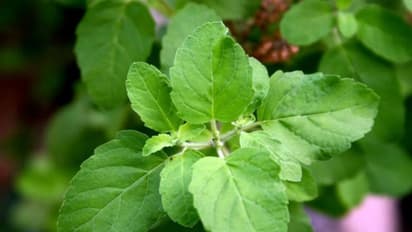Why it’s best to swallow tulsi leaves than chew it
Tulsi leaves are definitely one of the most commonly used ingredients in many Indian home remedies.

Tulsi, also known as the Holy Basil, is a sacred plant that you will find in most Indian households. It is often seated out in the aangan or a courtyard, watered carefully and worshiped by the members of the family. While Tulsi has a special religious significance, it is also prized for its medicinal qualities.
Tulsi, also known as the Holy Basil, is a sacred plant that you will find in most Indian households. It is often seated out in the aangan or a courtyard, watered carefully and worshiped by the members of the family. While Tulsi has a special religious significance, it is also prized for its medicinal qualities.
According to Ayurveda and traditional medicine, the bitter and slightly astringent Tulsi leaves are nature's best antibiotics. The essential oils found in Tulsi, effectively act on our respiratory system.
According to Ayurveda and traditional medicine, the bitter and slightly astringent Tulsi leaves are nature's best antibiotics. The essential oils found in Tulsi, effectively act on our respiratory system.
Tulsi leaves are definitely one of the most commonly used ingredients in many Indian home remedies. Be it a kadha to cure a congested chest and cough or a warm and soothing tea to relieve fever, Tulsi finds its way in many natural remedies that mothers and grandmothers swear by. It is also often recommended to start your day by having two to three fresh Tulsi leaves on an empty stomach.
Tulsi leaves are definitely one of the most commonly used ingredients in many Indian home remedies. Be it a kadha to cure a congested chest and cough or a warm and soothing tea to relieve fever, Tulsi finds its way in many natural remedies that mothers and grandmothers swear by. It is also often recommended to start your day by having two to three fresh Tulsi leaves on an empty stomach.
It is a great blood purifier and is known to flush out toxins and clean your internal systems. Along with this comes the advice to not chew Tulsi leaves but instead swallow them. There has been an ever-growing debate on whether Tulsi leaves should be swallowed or chewed with more support for the former as chewing them may bring certain negative consequences.
It is a great blood purifier and is known to flush out toxins and clean your internal systems. Along with this comes the advice to not chew Tulsi leaves but instead swallow them. There has been an ever-growing debate on whether Tulsi leaves should be swallowed or chewed with more support for the former as chewing them may bring certain negative consequences.
If we look at it from the religious context, some people believe that chewing Tulsi leaves is disrespectful as Tulsi was also the name of Lord Vishnu's (one of the three main Gods in Hinduism) wife and therefore, the plant is worshiped and considered sacred. But that's not all, there is a scientific side to this too which suggests that it is best to swallow Tulsi leaves.
If we look at it from the religious context, some people believe that chewing Tulsi leaves is disrespectful as Tulsi was also the name of Lord Vishnu's (one of the three main Gods in Hinduism) wife and therefore, the plant is worshiped and considered sacred. But that's not all, there is a scientific side to this too which suggests that it is best to swallow Tulsi leaves.
One reason is that Tulsi leaves contain a high amount of mercury and iron, which are released on chewing them. These minerals are known to damage your teeth and cause discoloration. Moreover, Tulsi leaves are also slightly acidic in nature and since the environment in our mouth is alkaline, it may cause the tooth enamel to wear away if consumed regularly in very large quantities. However, the fresh juice extracted from Tulsi leaves is often used as a home remedy for mouth ulcers.
One reason is that Tulsi leaves contain a high amount of mercury and iron, which are released on chewing them. These minerals are known to damage your teeth and cause discoloration. Moreover, Tulsi leaves are also slightly acidic in nature and since the environment in our mouth is alkaline, it may cause the tooth enamel to wear away if consumed regularly in very large quantities. However, the fresh juice extracted from Tulsi leaves is often used as a home remedy for mouth ulcers.
A great way to consume Tulsi is to prepare tea. It is known to boost your immunity and fight germs and can heal many skin disorders like acne. It is also believed to control your blood sugar levels. For a cup of herbal and caffeine-free tea, boil ¼ cup of Tulsi leaves with water. After the first boil, bring down the heat to low and let it brew for about 10 minutes. Add 1 teaspoon of honey and 2 teaspoons of lime juice and strain. Sip gently.
NOTE: Asianet News humbly requests everyone to wear masks, sanitize, maintain social distancing and get vaccinated as soon as eligible. Together we can and will break the chain #ANCares #IndiaFightsCorona
A great way to consume Tulsi is to prepare tea. It is known to boost your immunity and fight germs and can heal many skin disorders like acne. It is also believed to control your blood sugar levels. For a cup of herbal and caffeine-free tea, boil ¼ cup of Tulsi leaves with water. After the first boil, bring down the heat to low and let it brew for about 10 minutes. Add 1 teaspoon of honey and 2 teaspoons of lime juice and strain. Sip gently.
NOTE: Asianet News humbly requests everyone to wear masks, sanitize, maintain social distancing and get vaccinated as soon as eligible. Together we can and will break the chain #ANCares #IndiaFightsCorona